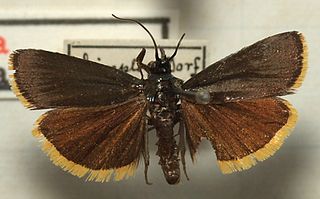Related Research Articles

Lepidoptera is an order of insects that includes butterflies and moths. About 180,000 species of the Lepidoptera are described, in 126 families and 46 superfamilies, 10 per cent of the total described species of living organisms. It is one of the most widespread and widely recognizable insect orders in the world. The Lepidoptera show many variations of the basic body structure that have evolved to gain advantages in lifestyle and distribution. Recent estimates suggest the order may have more species than earlier thought, and is among the four most speciose orders, along with the Hymenoptera, Diptera, and Coleoptera.
Sir George Francis Hampson, 10th Baronet was an English entomologist.

Coleophora is a very large genus of moths of the family Coleophoridae. It contains some 1,350 described species. The genus is represented on all continents, but the majority are found in the Nearctic and Palaearctic regions. Many authors have tried splitting the genus into numerous smaller ones, but most of these have not become widely accepted.

Eupterotidae is a family of insects in the order Lepidoptera with more than 300 described species.

Amphiesmenoptera is an insect superorder, established by S. G. Kiriakoff, but often credited to Willi Hennig in his revision of insect taxonomy for two sister orders: Lepidoptera and Trichoptera (caddisflies). In 2017, a third fossil order was added to the group, the Tarachoptera.

Urodidae or "false burnet moths" is a family of moths in the lepidopteran order, representing its own superfamily, Urodoidea, with three genera, one of which, Wockia, occurs in Europe.

The Thyatirinae, or false owlet moths, are a subfamily of the moth family Drepanidae with about 200 species described. Until recently, most classifications treated this group as a separate family called Thyatiridae.

Catastia marginea is a moth of the family Pyralidae. It was described by Michael Denis and Ignaz Schiffermüller in 1775 and is found in northern and central Europe and eastwards through Russia.

Dioryctria is a genus of snout moths. It was described by Philipp Christoph Zeller in 1846.

Catastia is a genus of snout moths. It was erected by Jacob Hübner in 1825, and is known from Bosnia and Herzegovina, Austria, Italy, and Greece.
Catastia acraspedella is a species of snout moth in the genus Catastia. It was described by Staudinger in 1879. It is found in Bulgaria.
Catastia kistrandella is a species of snout moth in the genus Catastia. It was described by Opheim in 1963. It is found in Fennoscandia and northern Russia.
Catastia bistriatella is a species of snout moth in the genus Catastia. It was described by George Duryea Hulst, in 1895. It is found in North America, including California.
Catastia incorruscella is a species of snout moth in the genus Catastia. It was described by George Duryea Hulst in 1895. It is found in North America, including Colorado, Utah and California.
Catastia uniformalis is a species of snout moth in the genus Catastia. It was described by George Hampson in 1903. It is found in India.
Catastia subactualis is a species of snout moth in the genus Catastia. It was described by Herbert H. Neunzig in 2003 and is found in the US state of California.
Cornifrons actualis is a moth in the family Crambidae. It was described by William Barnes and James Halliday McDunnough in 1918. It is found in North America, where it has been recorded from Arizona, California, Montana, Nevada, Texas and Utah. The habitat consists of deserts.
Eugene Gordon Munroe was a Canadian entomologist who discovered numerous species of insects. He worked for the Insect Systematics and Biological Control Unit, Entomology Division in Ottawa, Canada.
References
- 1 2 Catastia at Markku Savela's Lepidoptera and Some Other Life Forms
- ↑ mothphotographersgroup
- ↑ Beccaloni, G.; Scoble, M.; Kitching, I.; Simonsen, T.; Robinson, G.; Pitkin, B.; Hine, A.; Lyal, C., eds. (2003). "Catastia actualis". The Global Lepidoptera Names Index . Natural History Museum. Retrieved April 19, 2018.
- ↑ Bug Guide
| This Phycitini-related article is a stub. You can help Wikipedia by expanding it. |